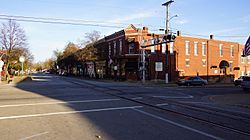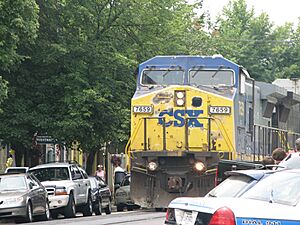La Grange, Kentucky facts for kids
Quick facts for kids
La Grange, Kentucky
|
|
|---|---|

Downtown La Grange
|
|

Location of La Grange in Oldham County, Kentucky.
|
|
| Country | United States |
| State | Kentucky |
| County | Oldham |
| Incorporated | January 23, 1840 |
| Named for | Lafayette's French estate |
| Government | |
| • Type | Mayor-Council |
| Area | |
| • Total | 7.30 sq mi (18.91 km2) |
| • Land | 7.22 sq mi (18.69 km2) |
| • Water | 0.08 sq mi (0.22 km2) |
| Elevation | 751 ft (229 m) |
| Population
(2020)
|
|
| • Total | 10,067 |
| • Estimate
(2022)
|
10,295 |
| • Density | 1,394.90/sq mi (538.58/km2) |
| Time zone | UTC-5 (Eastern (EST)) |
| • Summer (DST) | UTC-4 (EDT) |
| ZIP codes |
40031–40032
|
| Area code(s) | 502 |
| FIPS code | 21-43480 |
| GNIS feature ID | 2404848 |
La Grange is a city in Oldham County, Kentucky, in the United States. It is the main town, or seat, of its county. In 2020, about 10,067 people lived there.
A special thing about La Grange is that a CSX Transportation train track runs right down Main Street! You can often see trains passing through the middle of town.
Contents
History of La Grange
La Grange was started in 1827. This happened when the main office for Oldham County moved from another town called Westport. A person named Major William Berry Taylor suggested the move.
How La Grange Got Its Name
The new town was named after a French country estate. This estate, called Château de la Grange-Bléneau, belonged to Gilbert du Motier, also known as the Marquis de Lafayette. He was a hero of the American Revolution and had visited the area a few years earlier.
Becoming an Official City
For a short time, the county office moved back to Westport. But from 1838 onwards, it stayed in La Grange for good. The city officially became a city on January 23, 1840, by a decision from the state government.
Geography and Climate
La Grange is located in Kentucky. The United States Census Bureau says the city covers about 7.14 square miles (18.5 square kilometers). Most of this area is land, with a small part being water.
La Grange's Climate
The weather in La Grange has hot and humid summers. Winters are usually mild to cool. This type of weather is known as a humid subtropical climate.
Population and People
La Grange has grown quite a bit over the years! Here's how its population has changed:
| Historical population | |||
|---|---|---|---|
| Census | Pop. | %± | |
| 1840 | 233 | — | |
| 1870 | 612 | — | |
| 1880 | 490 | −19.9% | |
| 1890 | 670 | 36.7% | |
| 1900 | 646 | −3.6% | |
| 1910 | 1,152 | 78.3% | |
| 1920 | 1,060 | −8.0% | |
| 1930 | 1,121 | 5.8% | |
| 1940 | 1,334 | 19.0% | |
| 1950 | 1,558 | 16.8% | |
| 1960 | 2,168 | 39.2% | |
| 1970 | 1,713 | −21.0% | |
| 1980 | 2,971 | 73.4% | |
| 1990 | 3,853 | 29.7% | |
| 2000 | 5,676 | 47.3% | |
| 2010 | 8,082 | 42.4% | |
| 2020 | 10,067 | 24.6% | |
| 2022 (est.) | 10,295 | 27.4% | |
| U.S. Decennial Census | |||
In 2010, there were 8,082 people living in La Grange. About 43% of the homes had children under 18 living there. The average age of people in La Grange was about 33.8 years old.
Education in La Grange
La Grange has a public library where you can borrow books. It is a part of the Oldham County Public Library system.
Arts and Culture
The historic part of La Grange has many small businesses. You can find shops, places to eat, and art galleries there.
The Street-Running Train
One of the most famous things about La Grange is its unique train track. The CSX Transportation tracks run right along Main Street. This means freight trains share the street with cars and people! It's a very unusual sight.
Community Activities
Discover Downtown La Grange is a group that works to support businesses, share the city's history, and build community spirit.
La Grange also has a Farmers and Artisan Market. Here, you can buy local items, including fresh produce and handmade goods. The market is open from mid-May until late October.
Famous People from La Grange
Many interesting people have come from La Grange, Kentucky:
- Tom Blankenship (also known as Two Tone Tommy) – a bassist for the band My Morning Jacket
- D. W. Griffith – a well-known film director
- William J. Crowe – a former top military leader, Chairman of the Joint Chiefs of Staff
- Roland Isaacs – a former NASCAR race car driver
- Robert Mallory – a former U.S. Representative for Kentucky
- Marvin H. McIntyre – a secretary to President Franklin D. Roosevelt
- Buddy Pepper – a talented songwriter, pianist, and actor
- Knocked Loose – a hardcore punk band that started in 2013
See also
 In Spanish: La Grange (Kentucky) para niños
In Spanish: La Grange (Kentucky) para niños


